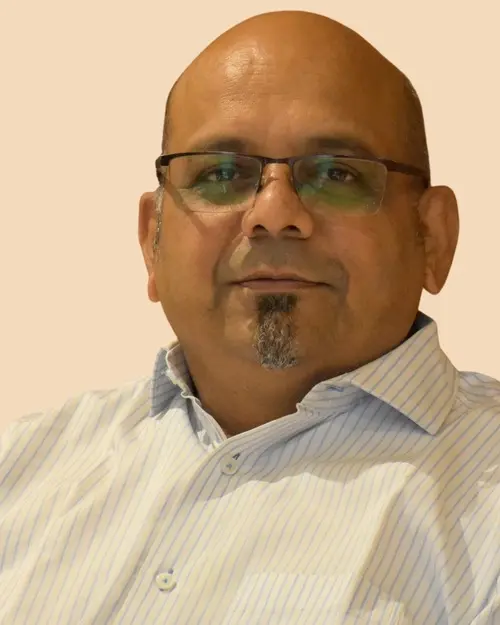Deepak B. Saxena

Email : ddeepak72@iiphg.org
Deepak B. Saxena
Director
IIPH Gandhinagar
Dr. Deepak B. Saxena is a trained physician (MD in Community Medicine and PhD in Epidemiology). He did his Post Doctorate in Public Health at Karolinska Institute Stockholm, Sweden, and is currently the Director of IIPH-Gandhinagar. The primary focus of his work has been on emerging Infectious diseases, antimicrobial resistance (AMR) and Water Sanitation and Hygiene (WASH). Other research areas of his interest include health systems, Community trials, Cohort studies, health technology assessments and integrating technology for early detection of Outbreaks. He is also actively serving as an editor, editorial board member and reviewer for many national and international scientific research journals in public health.
Dr. Saxena has been leading multi centric studies focused on WASH assessment of healthcare facilities (HCFs), including public and private sectors, Anganwadi Centres (a nutritional hub point in the rural community of India), and household level (for general community and livestock handlers). Beyond the primary implementation research, he also has a huge experience in capacity building of healthcare workers, reviewing the (guidelines, methods, tools, and frameworks), conducting secondary research, and supporting governmental and developmental organizations. Dr. Saxena is also on the Technical Advisory Group to generate evidence for WASH in the health care facility at WHO-HQ. He is also leading the Centre for Research on One Health Education and Research (COHERD) with the support of the University of Bonn at IIPHG. The centre contributes to education, research, and overall development. Within the broad field of One Health, the centre’s key focus is on zoonotic diseases, antimicrobial resistance, health system strengthening, disease surveillance, and biosecurity in South and East Asia. Dr. Saxena is also presently leading the project on Green and Climate Resilience in health care facilities.
- Water Hygiene and Sanitation (WASH)
- One Health
- Climate change
- Yasobant S, Saxena D, Tadvi R, Syed ZQ. One Health Surveillance System in Gujarat, India: A Health Policy and Systems Research Protocol for Exploring the Cross-Sectoral Collaborations to Detect Emerging Threats at the Human-Animal–Environment Interface. Trop Med & Infect Dis. 2023; 8(9):428. (DOI: 10.3390/tropicalmed8090428)
- Kalpana P, Falkenberg T, Yasobant S, Saxena D, Schreiber C. Vegetables as a vehicle for antimicrobial resistance (vAMR): An agroecosystem exploration from the One Health perspective in India. F1000Research2023; 12:316. (DOI:10.12688/f1000research.131679.1)
- Yasobant S, Bruchhausen W, Saxena D, Memon F, Falkenberg T. Health system contact and awareness of zoonotic diseases: Can it serve as One Health entry point in the Urban community of Ahmedabad, India? Yale Journal of Biology and Medicine, 2021; 94(2):259-269. (PMID: 34211346)
- Yasobant S, Bruchhausen W, Saxena D, Falkenberg T. Systemic factors for enhancing intersectoral collaboration for the operationalization of One Health: a case study in India. Health Research Policy and Systems, 2021; 19: 75. (DOI:10.1186/s12961-021-00727-9)
- Trivedi, Poonam & Bhavsar, Priya & Kalpana, Pachillu & Patel, Krupali & Das, Tanmoy & Yasobant, Sandul & Saxena, Deepak. (2023). Dissecting WASH Assessment Tools and Recommending a Comprehensive Tool for Indian Healthcare Facilities. Risk Management and Healthcare Policy. 16. 1593-1610. 10.2147/RMHP.S376866.
- Bhavsar P; Kalpana Pachillu; Kaul Annapurna; Patnaik Sweta; Ryavanki Sridhar; Saha Somen; Saxena Deepak. How much does it cost to meet the standards for making healthcare facilities water, sanitation, and hygiene (WASH) compliant?: analysis from Assam, India. Journal of Water, Sanitation and Hygiene for Development (2022) 12 (4): 347–358.
- Kalpana P, Trivedi P, Bhavsar P, Patel K, Yasobant S, Saxena D. Evidence of Antimicrobial Resistance from Maternity Units and Labor Rooms: A Water, Sanitation, and Hygiene (WASH) Study from Gujarat, India. Healthcare (Basel). 2022 Mar 30;10(4):648. doi:10.3390/healthcare10040648.
- Pachillu Kalpana, Sandul Yasobant, Krupali Patel, Deepak Saxena. Water, Sanitation, and Hygiene (WASH) during COVID19 pandemic in India: Practicability in poor settings! 2021. Social Sciences & Humanities Open 4 (2021) 100195.
- Trivedi P, Patel K, Yasobant S, Kalpana P, Bhavsar P, Raval D, Saxen a D. Visually clean is not necessarily microbiologically safe: Learnings from WASH assessment of maternity units of Gujarat, India. J Family Med Prim Care. 2020; 9:788-92. (DOI: 10.4103/ jfmpc. jfmpc_1066_19).
- Krupali Patel, Pachillu Kalpana, Poonam Trivedi, Sandul Yasobant, Deepak Saxena. Assessment of water, sanitation and hygiene in HCFs: which tool to follow? Reviews on Environmental Health,2019; 34(4).
- Suzanne Cross, Giorgia Gon, Emma Morrison, Koasar Afsana, Said M. Ali, Tina Manjang, Lamin Manneh, Atiya Rahman, Deepak Saxena, Kranti Vora, Wendy J. Graham. (2019) An invisible workforce: the neglected role of cleaners in patient safety on maternity units. Global Health Action, 12:1.
- Suzanne Cross, Koasar Afsana, Morseda Banu, Dileep Mavalankar, D., Emma Morrison, Atiya Rahman, Tapas Roy, Deepak Saxena, Kranti Vora & Wendy J Graham. (2016) Hygiene on maternity units: lessons from a needs assessment in Bangladesh and India. Global health action, 9, 32541.
- Timo Falkenberg, Deepak Saxena, Thomas Kistemann. Impact of wastewater irrigation on in-household water contamination. A cohort study among urban farmers in Ahmedabad, India. Science of the Total Environment, 2018; 639, 988-996.

